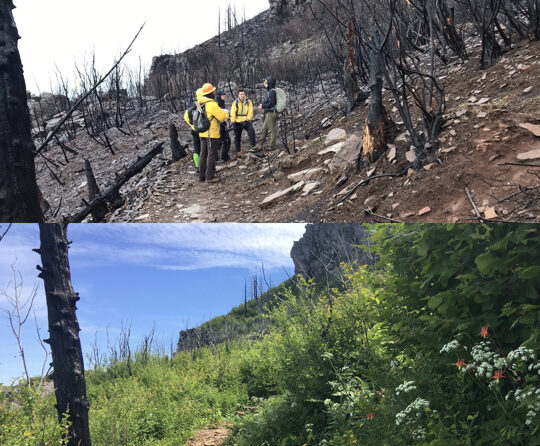A class action lawsuit against PacifiCorp by survivors of multiple 2020 wildfires has been partially dismissed, with remaining claims headed to trial April 24.
On Jan. 10, Multnomah County Circuit Court Judge Steffan Alexander granted summary judgment in Jeanyne James, et al. v. PacifiCorp, ruling in defendant’s favor on one count of alleged negligence and a request for a safety injunction.
Six causes for damages remain, with plaintiffs seeking $2.2 billion on behalf of roughly 5,000 survivors of the 2020 Santiam Canyon, Obenchain, Echo Mountain Complex and 242 fires. PacifiCorp is accused of negligently causing or intensifying the fires, a claim the company strongly denies.
Alexander ruled in response to a motion for partial summary judgment filed by PacifiCorp Oct. 27, 2022. PacifiCorp sought rulings in its favor on six out of seven causes of action. The motion argued plaintiffs had failed to support claims of negligence, gross negligence, private nuisance, and public nuisance and trespassing. It also said they failed to demonstrate why the court should grant an injunction compelling PacifiCorp to take additional steps to mitigate fire risks.
Alexander rejected most of the defendant’s arguments, but granted a ruling on the issue of “negligence per se”, which describes an act that negligently violates a specific law.
Plaintiffs claimed PacifiCorp negligently violated Oregon laws requiring public utilities to safely maintain and operate their equipment. PacifiCorp said the laws in question do not specifically define safety standards and determining whether or not they were negligently violated would require an interpretation of the laws, which is not allowed in a claim of negligence per se.
Separate counts of common law negligence – which defines a failure to exercise a reasonable level of care, and gross negligence – which defines an extreme departure from reasonable levels of care – were allowed to remain.
Alexander ruled in favor of the defendants on a request by plaintiffs for an injunction compelling PacifiCorp to adopt technologies that have proven effective in preventing wildfires, such as burying transmission lines and de-energizing lines during wildfire conditions.
While attorneys for the plaintiffs argued it was acceptable in lawsuits to request injunctions that prevent further injury, PacifiCorp argued the injunction was a separate matter from in the lawsuit, as the 2020 fires are no longer a threat and court intervention cannot prevent further harm.
The judge determined the remaining claims challenged by PacifiCorp, including private nuisance (harm to private individuals), public nuisance (harm to the public) and trespass (encroaching on the rights of property owners) should be decided by a jury.
A claim of inverse condemnation, which accuses PacifiCorp of taking private land for its utility infrastructure and causing damage to that land, was not challenged.
This ruling comes after Alexander ordered a PacifiCorp claims agent to testify about information obtained regarding the potential cause and origin of the fires.
The agent was deposed last October, and during her testimony she received multiple reminders from PacifiCorp attorneys to not share privileged information. PacifiCorp attorneys said this was standard practice as the agent was acting under their direction. The plaintiffs argued these reminders had a chilling effect and caused the agent to limit her testimony.
Plaintiffs told the judge the testimony of the claims agent and other PacifiCorp employees was vital because it is no longer possible to directly examine fire damage. Much of it has been cleaned up and the workers who directly witnessed and documented such damage are now primary sources of information. They asked PacifiCorp be compelled to allow such employees to testify, saying similar instances to the October deposition have occurred with several other PacifiCorp employees with attorneys allegedly coaching witnesses to not answer questions about the cause and origin of the fire.
Parties argued the matter during a hearing Dec. 19, 2022. Eight days later Alexander ordered the claims agent to be deposed once more and answer questions about opinions they had formed regarding the cause of the fires, and to produce evidence including written notes, photos and video documenting their findings.
Editor’s note: This article has been corrected to accurately reflect the number of class members.
